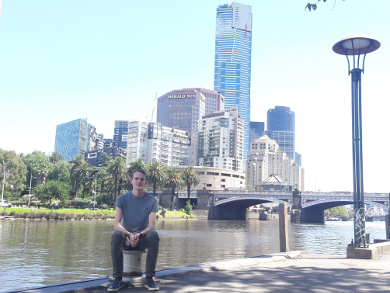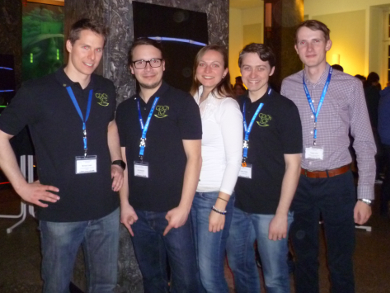Torsten John is conducting research in biomolecular systems, computational modeling and simulation, biophysical chemistry, and bioengineering to advance our understanding of biochemistry and develop new materials.
We met at the Advanced Summit 2024, hosted by Wiley-VCH in Weinheim, Germany, where he discussed his research, new position as an Assistant Professor in Bremen, and experiences from various international research stays with Vera Koester from ChemistryViews. He also talked about his roles in the Young Chemists Forum of the GDCh, as well as his involvement with the European Young Chemists’ Network (EYCN) and the International Younger Chemists Network (IYCN).
Short CV
Torsten John studied chemistry at Leipzig University, Germany, and received his Ph.D. from the same university in 2020 under the supervision of Bernd Abel. During his Master’s and Ph.D. studies, he had research stays in the laboratories of Lisandra L. Martin, Monash University, Clayton, VIC, Australia, and Alan E. Mark, University of Queensland, Brisbane, QLD, Australia.
After a postdoctoral period at the Massachusetts Institute of Technology (MIT), Cambridge, MA, USA, with Mark Bathe in the Department of Biological Engineering, and a postdoctoral period from June 2023 to August 2024 with Tanja Weil at the Max Planck Institute for Polymer Research, Mainz, Germany, he is Assistant Professor of Physical Chemistry at Constructor University Bremen, Germany, since September 2024.
Torsten John’s research interests are the design and theory of bionanomaterials with a focus on peptide and DNA self-assembly, where he integrates experimental techniques and theoretical models to reveal the fundamental principles of biomolecular interactions.
Torsten John has received many awards, including recognition as a CAS Future Leader, an Endeavor Research Fellow, and a member of the IUPAC Periodic Table of Younger Chemists. He was also selected as a young scientist for the Lindau Nobel Laureate Meeting.
Selected Publications
- M. Hayn, T. John, J. Bandak, L. Rauch‐Wirth, B. Abel, J. Münch, Hybrid Materials From Peptide Nanofibrils and Magnetic Beads to Concentrate and Isolate Virus Particles, Adv. Funct. Mater. 2024, 34 (27), 2316260. https://doi.org/10.1002/adfm.202316260
- T. John, A. Rampioni, D. Poger, A. E. Mark, Molecular Insights into the Dynamics of Amyloid Fibril Growth: Elongation and Lateral Assembly of GNNQQNY Protofibrils, ACS Chem. Neurosci. 2024, 15 (4), 716–723. https://doi.org/10.1021/acschemneuro.3c00754
- T. John, S. Piantavigna, T. J. A. Dealey, B. Abel, H. J. Risselada, L. L. Martin, Lipid Oxidation Controls Peptide Self-Assembly near Membranes through a Surface Attraction Mechanism, Chem. Sci. 2023, 14 (14), 3730–3741. https://doi.org/10.1039/D3SC00159H
- T. John, J. Adler, C. Elsner, J. Petzold, M. Krueger, L. L. Martin, D. Huster, H. J. Risselada, B. Abel, Mechanistic Insights into the Size-Dependent Effects of Nanoparticles on Inhibiting and Accelerating Amyloid Fibril Formation, J. Colloid Interface Sci. 2022, 622, 804–818. https://doi.org/10.1016/j.jcis.2022.04.134
- H. Jun, X. Wang, M. F. Parsons, W. P. Bricker, T. John, S. Li, S. Jackson, W. Chiu, M. Bathe, Rapid Prototyping of Arbitrary 2D and 3D Wireframe DNA Origami, Nucleic Acids Res. 2021, 49 (18), 10265–10274. https://doi.org/10.1093/nar/gkab762
- T. John, A. Gladytz, C. Kubeil, L. L. Martin, H. J. Risselada, B. Abel, Impact of Nanoparticles on Amyloid Peptide and Protein Aggregation: A Review with a Focus on Gold Nanoparticles, Nanoscale 2018, 10 (45), 20894–20913. https://doi.org/10.1039/C8NR04506B
Also of Interest

Why would someone do a joint Ph.D. project across continents? What are advantages and challenges?
 Interview: Working for the JCF – The Young Chemists’ Forum of the German Chemical Society
Interview: Working for the JCF – The Young Chemists’ Forum of the German Chemical Society
Members of the national board about the work and aims of the JCF and their personal motivations




